11.30.12
Attempts to Make Unitary Patent Mess Before Xmas

Summary: A loophole for software patents in Europe is making its way into law while many vigilant people are very busy or on vacation, just like last year when this was also attempted
“The Patent Courts will be voted on as early as the 10-11th of December in parliament and council. After that there will be a formal signing later in December or January,” says Jonas from the FFII. “If there are no changes to the proposal, it will just go through as a inter member-state agreement where the EU will have no further say directly,” he adds. “Just like EPO where national or EU-courts have no way of appealing over EPO rulings in what can be patented. See https://www.unitary-patent.eu/ for more updates.”
The latest update says:
On Monday, November 26th, 2012, the legal affairs (JURI) Committee of the European Parliament held an exchange of views with the legal services on the legality of the Cypriot compromise on the unitary patent regulation. Once again, the illegalities of the project have been made obvious, but nonetheless the European Parliament seems decided to go forward. April calls for a re-examination of the text and the possibility to amend it, to ensure legal certainty.
After lawyers, law professors, and various specialists, it is the Legal Services of the European Parliament’s turn to voice reservations about the legality of the organisation of the patent package. Indeed, the current proposal for a unitary patent package mixes elements of EU law and international law, and asks the European Parliament to give up all safeguards on defining patentatibility. All checks and balances, and our rights, including the rights to code, would then be questioned.
Software patentability, and the means of recourse against such threats to innovation, were briefly mentioned, but only to state that legal services do not know whether there will be any legal instance to oppose them.
Techright will keep its eyes open. Gérald Sédrati-Dinet, of the above site, shows that this disease of software patents spreads to Europe through other loopholes. “How software patents #swpats are routinely accepted in Europe by artificially circumventing law,” he writes, pointing to this article which states:
Although technical character is a fundamental requirement for the grant of a European patent, its significance is often overlooked. However, lack of technical character is perhaps the single most important reason why many applications for computer-implemented inventions are refused by the European Patent Office. So what exactly is technical character and why is it so important?
Interestingly, the European Patent Convention (EPC) does not explicitly state that an invention must have technical character. However, the requirement is inferred from Rules 42 EPC and 43 EPC of the Implementing Regulations, whose conditions are distilled into the requirement of technical character. To have technical character an invention must relate to a technical field, it must be concerned with a technical problem and it must have technical features.
When considering an invention which is implemented on a computer, it is arguable that the most important of these three aspects to consider is the technical problem. This is because if a technical problem is solved, then, because a computer provides the technical means by which the solution is provided, it follows that the invention must lie in a technical field and that technical features are inherently involved. So, if a technical problem is solved, a computer-implemented invention is likely to exhibit technical character.
We need to stop this because the longer it goes on for, the more it solidifies software patenting across the EU. █
































 Content is available under CC-BY-SA
Content is available under CC-BY-SA